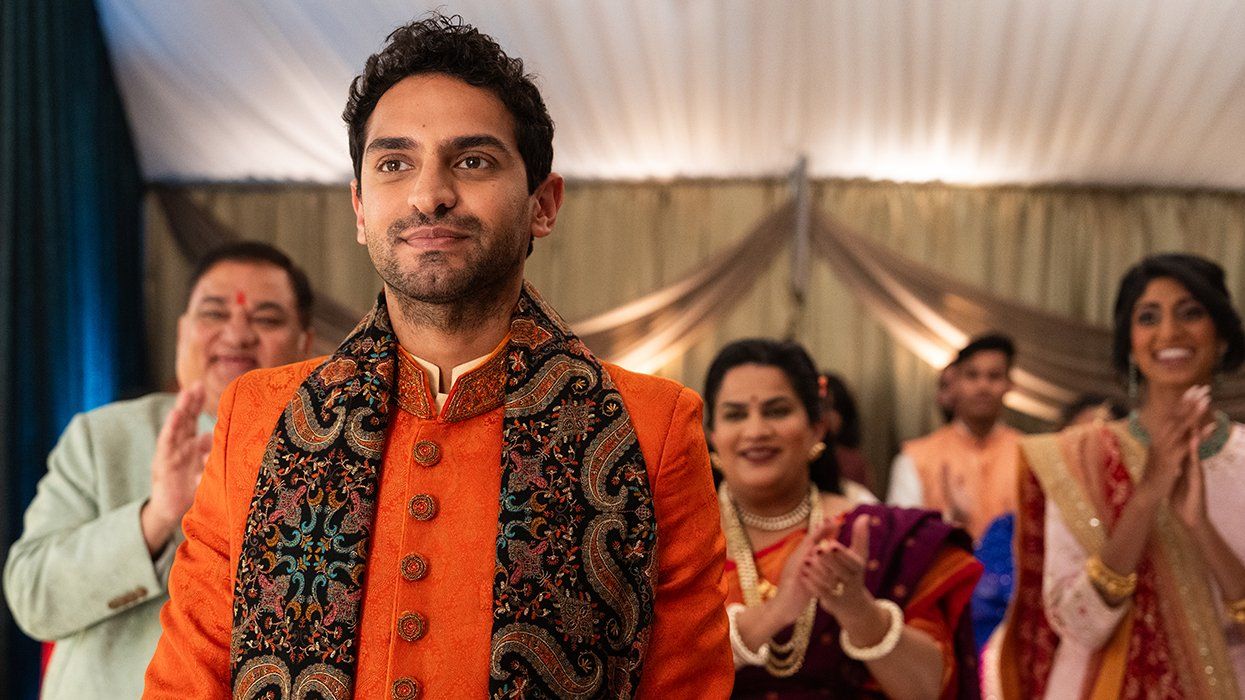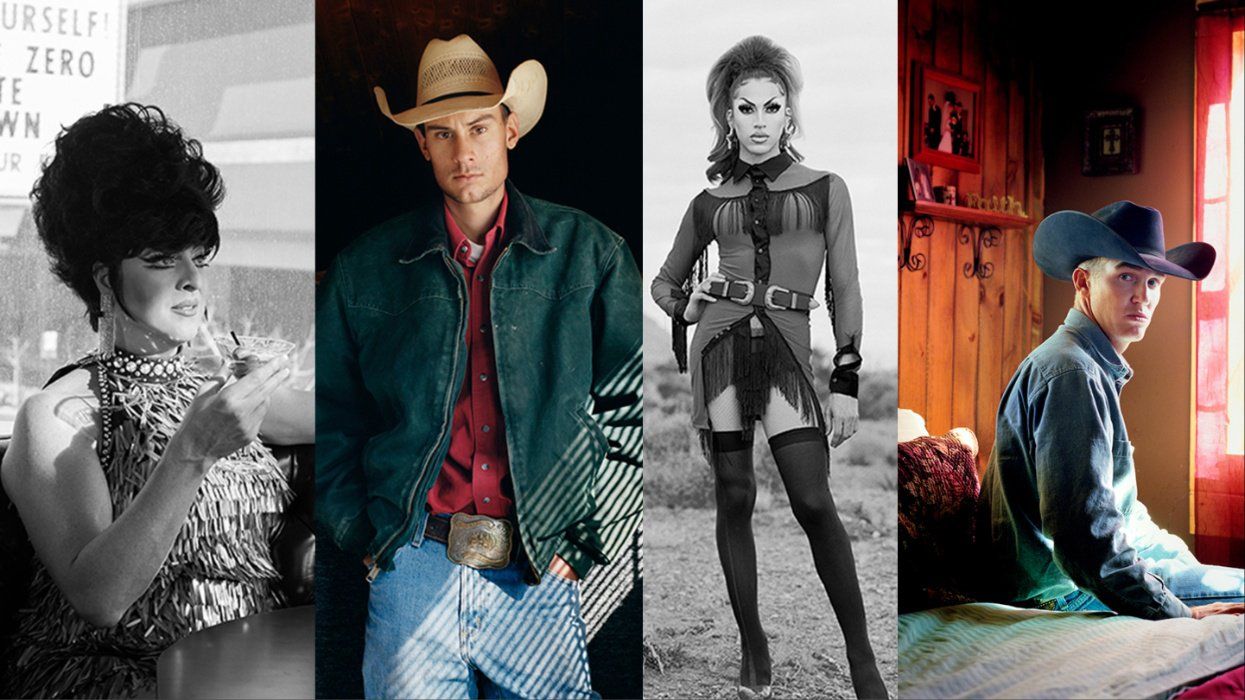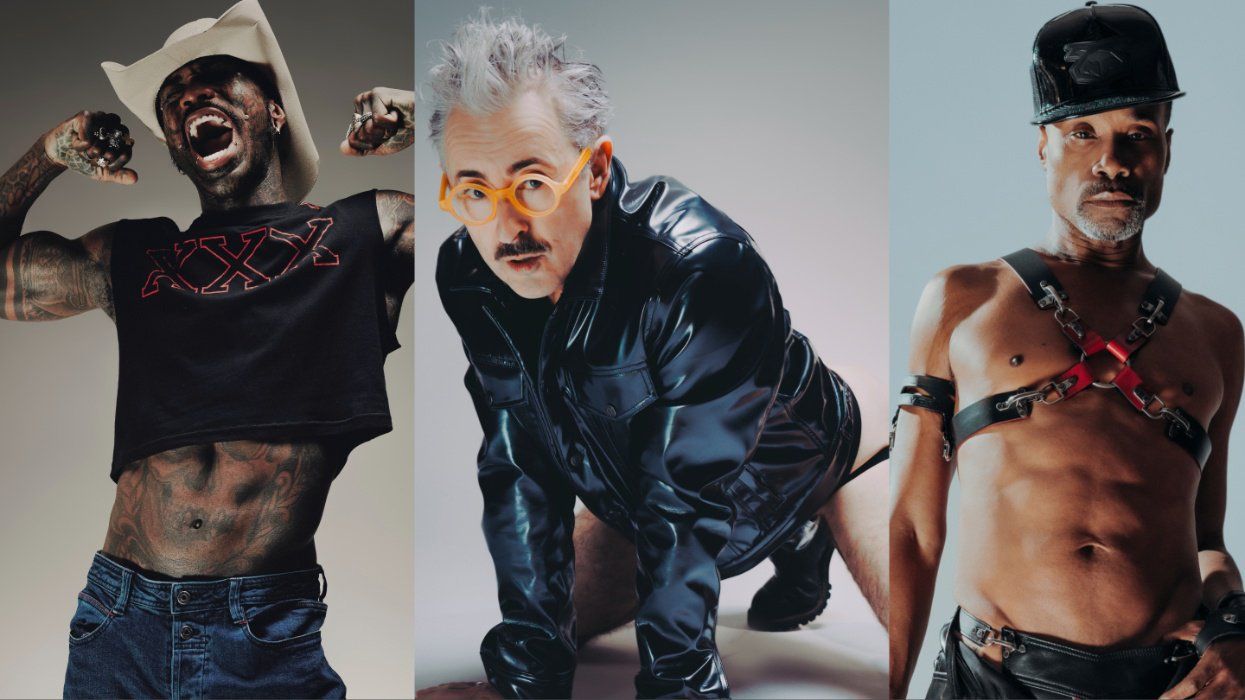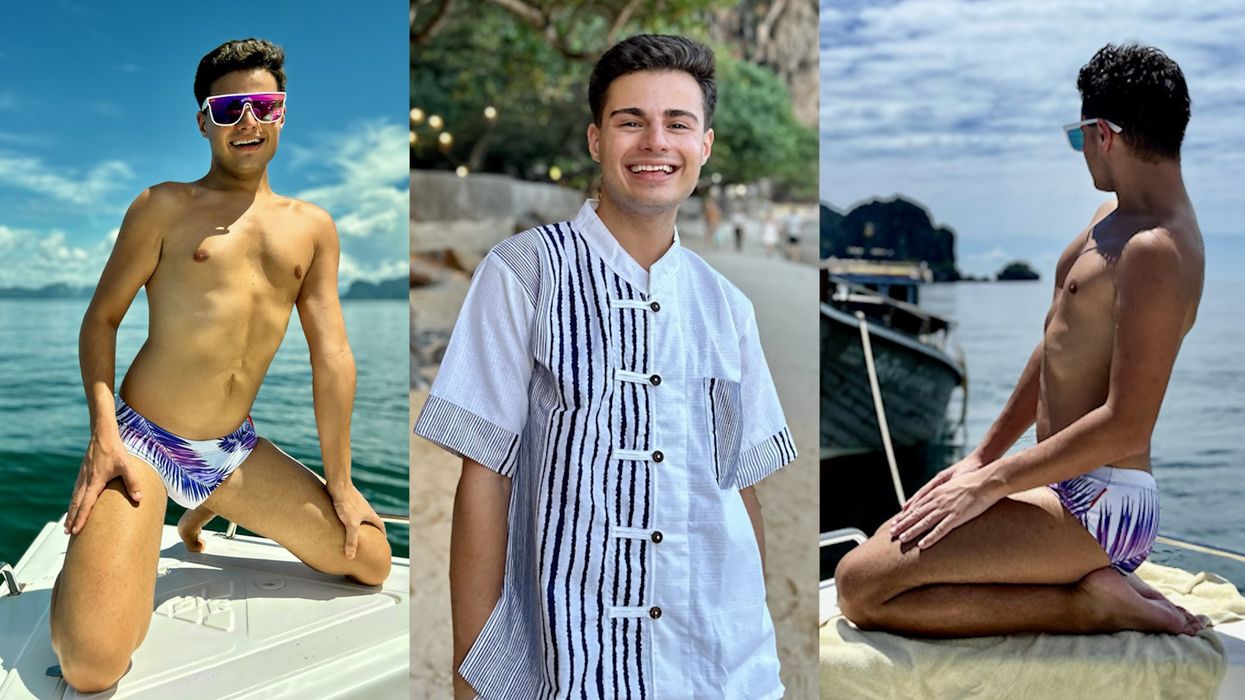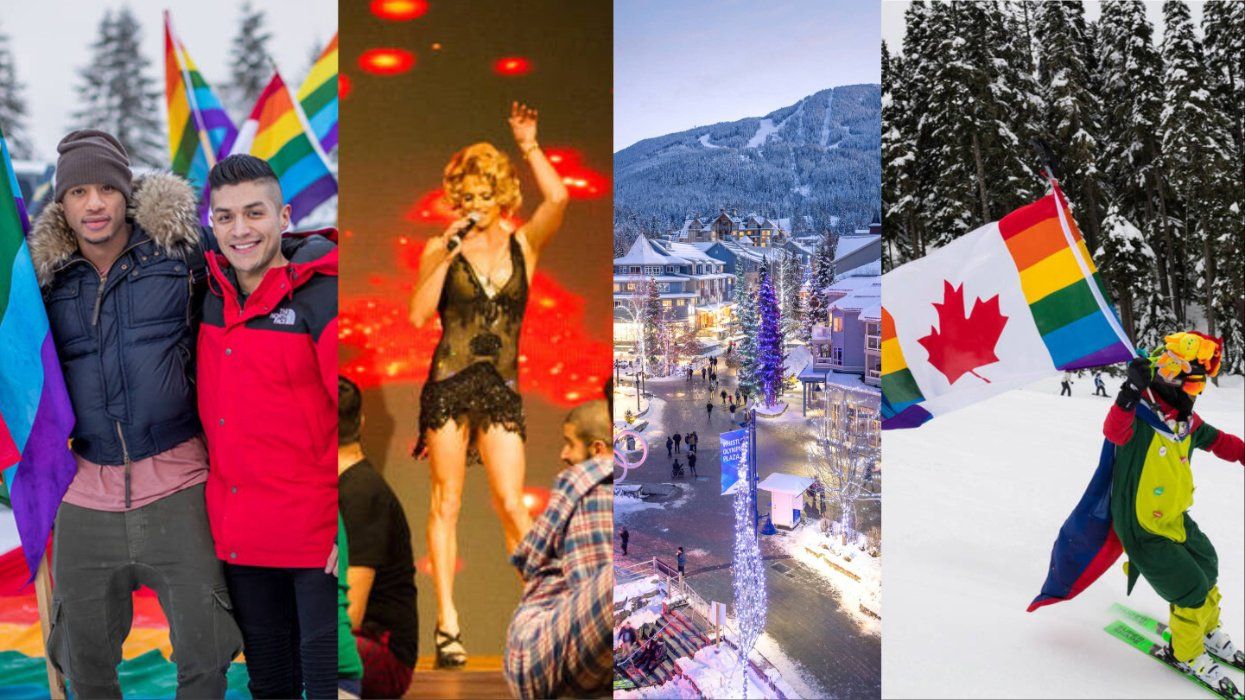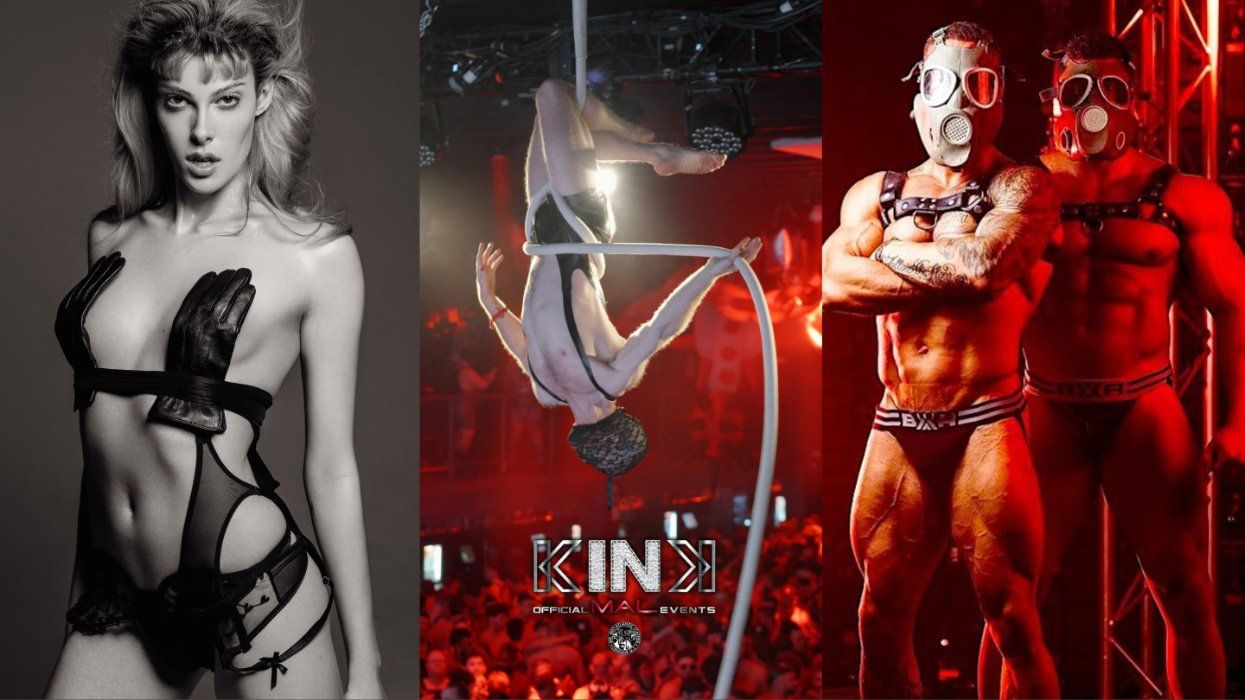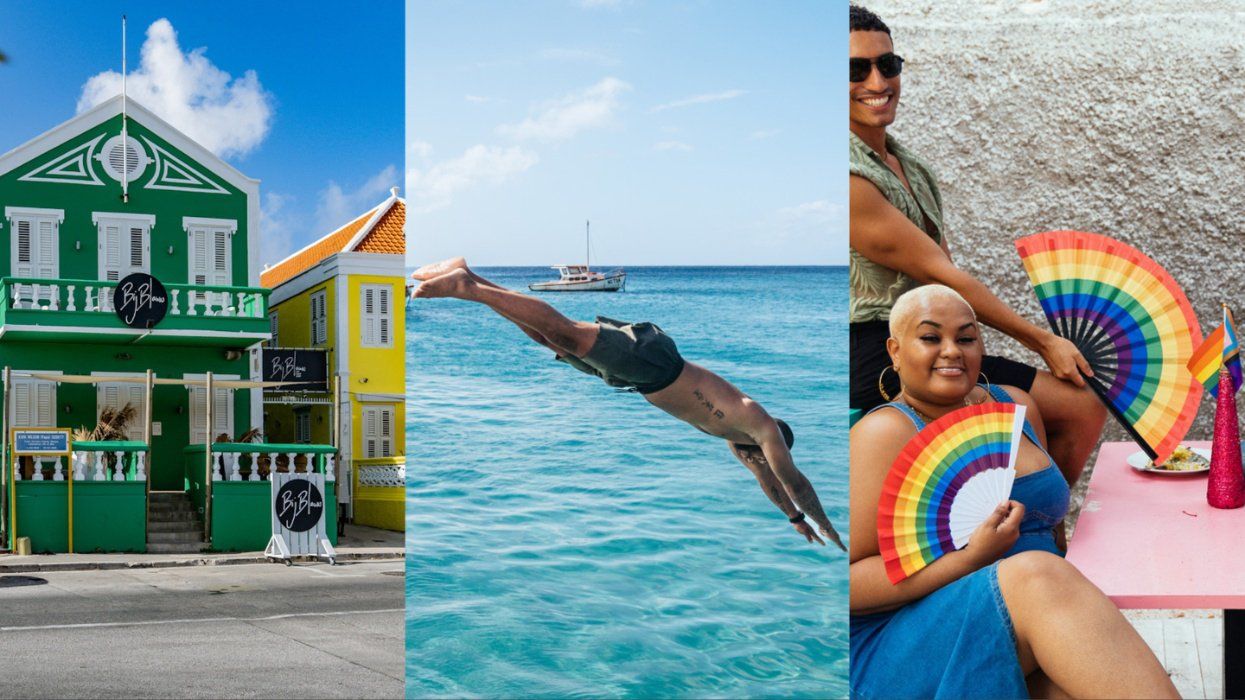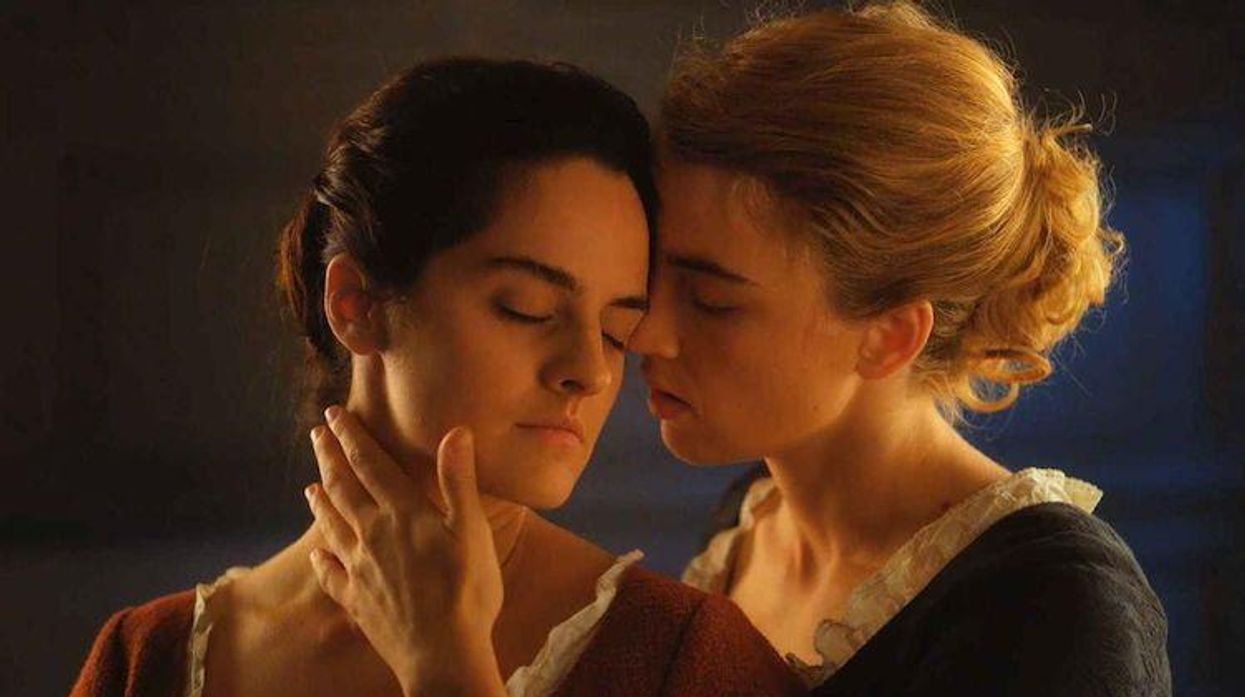CONTACTAbout UsCAREER OPPORTUNITIESADVERTISE WITH USPRIVACY POLICYPRIVACY PREFERENCESTERMS OF USELEGAL NOTICE
© 2025 Equal Entertainment LLC.
All Rights reserved
All Rights reserved
Scroll To Top









By continuing to use our site, you agree to our Privacy Policy and Terms of Use.
9 Stories from Queer Figure Skaters in Their Own Words

This story was published in collaboration with the critically acclaimed podcast Blind Landing. You can listen to its second season, which documents the history of queer figure skaters, on Apple Podcasts or wherever you get your podcasts.
We all know the stereotype about male skaters being queer. You can find countless pop culture references about skating where it's a punch line to a joke -- in TV shows like Friends ("I'm an ice dancer -- all my friends are gay!"), The Simpsons ("Don't you hags know that all male figure skaters are 'twinkly in the lutz'?") and Sex and the City ("He's a bisexual" / "Well I could've told you that, sweetie. He took you ice skating, for God's sake.").
And from the outside, figure skating might very well look like a queer haven, a space where LGBTQ+ athletes can be out and open ... but inside of the sport? That couldn't be farther from reality.
While the presence of queer skaters in the sport can be traced as far back as the 1950s, it wasn't until 2018 that Adam Rippon and Eric Radford became the first out gay figure skaters to compete at the Olympics. If that sounds surprising to you, you're not alone -- even Adam Rippon has a hard time wrapping his head around that stat: "I don't believe it. It feels unbelievable," Rippon says. "I was like, this can't be true in 2018."
Of course, there have been numerous gay skaters at the Olympics -- multiple queer Olympic champions, even ... but for most of skating's history, none felt like they could be out on the Olympic stage.
For decades, athletes have been pushed to play into narrow gender stereotypes on and off the ice, leaving LGBTQ+ athletes feeling like being themselves wasn't an option. For the new season of the documentary podcast Blind Landing, we spoke with queer figure skaters from across generations and across the LGBTQ+ spectrum, including Adam Rippon, Amber Glenn, Timothy LeDuc, Randy Gardner, Tim Goebel, Eliot Halverson, Jeremy Abbott, and Karina Manta, to hear stories about what it's really like for queer skaters in the sport.
(These interview excerpts have been edited and condensed for brevity and clarity.)
Adam Rippon on learning to feel comfortable in his self-expression in his personal life — and on the Olympic stage

Adam Rippon (he/him) was the 2016 U.S. national champion, won a bronze medal at the 2018 games, and became the first out athlete to represent Team USA at the Winter Olympics.
Nagano is truly the first time I remember sitting down and watching [figure skating], and remembering the names. And it was all Michelle Kwan, all Tara Lipinski... I kind of had to push myself to watch the men. I did have my favorites, but it was the ladies' side of it. It was just... it was more dramatic. It was more everything. It was unlike anything I had ever fallen in love with before. There's not that much drama playing baseball.
[As a kid], I vividly remember this one girl coming up to me while the hockey players were coming into the rink and she was like, "I bet you really like watching them come into the rink," and I was like, "Huh?" And she's like, "I see you're watching them all." And I was like, "I don't know what you're talking about." I'm having a full-blown panic attack.... I think as I got older, it was definitely this internalized sense of homophobia that I felt was completely rampant. I felt it in everything that I did.
I was at Skate America [in 2016] and they had this rule -- it was a brand-new rule -- where men could show their shoulders in a costume. Obviously, the shoulder is the most famous male private part... I was like, 26, 27, and I remember I did it, and it was the program I competed at the Olympics, but I had that program for a few years. So I skated to Ida Corr, this club song from 2007 (keeping it current), and you know, it was kinda gay. And I'm in a tank top.
I remember I skated it once for the U.S. officials and they were like, "I don't really see how this is going to pan out for you." And at that point I was like, "I'm doing it because I want to do what I want to do at this point.... I'm going to do what I want to do because I know I'll do that well. And if I do something well, you can't be denied success"-- was my mentality. And so I remember I just kept this program and I skated it at Skate America, this like gay-ish program. [Afterwards], the Russian judge found me and asked me where my coach was, and I'm like, "Here we go." She goes over to my coach, Rafael Artinian, and they're speaking in Russian. I'm [thinking] "She's probably bashing me." She came over to me and she starts pointing at the shoulders and this and that and she walks away. And basically, the Russian judge [had said], "I like the program, but you have to go more over the top. There needs to be more [sequins] on the back. If [you're] going to be doing all this, just go for it. Like, go for it more." And that's when I [realized] oh, it's people who don't know all the answers trying to give you advice.
Of the fears that existed and of the precautionary tales I was told, none of it was real. And now, when I look back, I think the advice and a lot of the things I was told were based on people's experiences, and they were relaying their own experiences to me to help me. They didn't say it to set us back as a community. They weren't trying to be these roadblocks. They were trying to save me from experiences that they had... [but] I think what I knew that they didn't know was that maybe more people would be ready.
Randy Gardner on growing up in the 60s, a secret relationship with another top skater in the 70s and finding community in the 80s

Gardner (he/him) is a five-time U.S. pairs national champion. He was also the 1979 world champion.
I was surrounded by girls the whole time [I skated] when I was a boy. There were maybe a couple other boys at the rink, skating and training and taking lessons. But pretty much it was 90 percent girls... [so] when I was younger, I was teased -- you know, "f****t" and all that kind of stuff.
I knew I was different. I never acted on anything. I was attracted to boys, but nothing intimate happened until later. I definitely was in the closet as a boy and later. I didn't really publicly come out till I was 50. Of course, everybody knew or assumed they knew.
My very first boyfriend was Robin Cousins. This was '77, '78, '79, in that time frame. And we had to keep it a secret, so to speak. And then word kind of got out and John Nicks, our coach, took me and my dad in and said, "We have to put a squelch on these rumors." So we kind of had to be on the down low, Robin and I. We had to sneak off to be together and all that stuff.
It was love. It was embracing that feeling, having a partner. It felt really good because he was like me and we spoke the same language. We were sort of in our own little world... it was our own little capsule that we created. In Lake Placid, at the [1980 Winter] Olympics, we found empty trailers so we could go hang out and do our thing -- in the Olympic Village!
We had to sort of play by those rules because being gay on the Olympic stage and the world stage, an elite athlete, you have to be careful because the reputation of endorsements was on the table. So we had to be very mindful of that, and I knew that, so I had to sort of lie and not be truthful about all that.
When [my skating partner Tai and I] turned pro in 1980, and did Ice Capades and all that, it was a little better because people on the show were gay. We could be ourselves there on the road... everybody was accepting. I was like, "Oh my God, this is great. There are people like me." It all felt good. Nobody cared, and it was like our own little circus world and nobody could get in. That was 1980, and still there was not any time to really come out; I didn't want to. It was still a little scary, so I was uncomfortable being out in public, and that's why -- being in the show for those first three years -- I could go back to that world where I could just fit in.
Eliot Halverson on her journey of self-discovery in a sport with a rigid understanding of gender and sexuality

Halverson (she/her) is a two-time U.S. junior national champion as well as a member of the U.S. Figure Skating Diversity, Equity, and Inclusion Task Force.
I think that the outside assumption is that everybody in skating is gay, and that because of that it would just be a very safe place for queer people. I think those are just the big assumptions.
Before I was surrounded by the skating community, I was listening to my own voice. I was in a very safe place in my home and had so much support in my gender journey. I was into dance, I was into gymnastics, I was into horseback riding... I was very proud of who I was and I loved being feminine. I wore all the pink, I wore all the... just Barbies down the street.
As soon as I entered a more serious rink when I was around 10, and really started pursuing it more seriously, I was super, super conscious of the fact that they were running a comb through every kid through the lens of "Is this kid gay?" I mean, I was asked if I was gay at a very, very young age and told that I was gay and told that I was very, very, very gay-- just like the most.
I think that generally in society, we're all learning more about trans people and all the different trans experiences and identities... but I think even more so in skating there is just a lack of understanding of what being queer is. I think it's only seen [that there is] one kind of queer person, which is a gay person-- and to be honest, a gay man.
I'm met with so much confusion a lot of the time. It's like "Oh, this is just so much to learn," "how I can possibly call somebody 'they/them'," "I just... I can't wrap my head around that." It's like, yes, this is a lot to learn, and to be honest, yeah, a lot of it is confusing -- so can you take that confusion that you're feeling and can you imagine what it's like to be an 8-year-old experiencing that about yourself? It is confusing if you have a boy body and the world is telling you you're a boy, and you know that you're not. That is fucking confusing! So turn your confusion into empathy [because] it is a million times worse and a million times more confusing and frustrating for the actual kid experiencing it. Be confused -- but override that confusion with empathy, because you have to have compassion for the people who are actually experiencing it.
Timothy LeDuc on the challenging constraints of gender expectations in figure skating as a non-binary skater

LeDuc (they/them) is a two-time U.S. pairs national champion. They are also the first out nonbinary athlete to compete at the Winter Olympics.
[Growing up,] my only understanding of gay people or of queer people was when our priest, our preacher, was speaking about them in the church. And it would be a hellfire speech saying, "gay people are abominations and going to hell" and "you better not be gay." And that was my only understanding of gay people, so it never connected for me. Like, why on earth would I think this sport that I love so much would be associated with quote unquote abominations?
A huge part of my journey is people pushing me into the masculinity box. For me, as a nonbinary person, that's been especially damaging. It's always... being told that your value is in portraying masculinity. Your value as a skater and as a person comes from portraying masculinity on the ice and off the ice; So it's something I've really worked on in the last couple of years since coming out and realizing the depth of my queerness -- you know, trying to find authenticity, and being comfortable expressing things that may be considered more feminine. And trying to kind of break out of this -- I call it the "Masc Mask"-- that masculinity mask we put on. I've literally had coaches before big competitions pull me into the boards right before you go out and they call your name, and coaches have said to me, "Timothy, go out and show them how masculine you are, be a man." So those are the things that I associated-- like me being a man, which was strong, and being masculine on the ice-- that was going to give me the scores. That's what was going to help me find the success that I was seeking.
I started referring to myself as queer [about] four years ago, rather than gay. So it's kind of been a very slow process of coming out and then finally saying it with words this year. But I've never, ever felt alone because I see queer and trans skaters on the ice every day in my rink. I'm in contact with other queer and trans youth that are coming through the sport now that are in the competition pipeline, that are in very formative years of their journey through the sport. So I've never felt alone because I feel them all here with me now. We've always been here. We're just suddenly a little bit more visible, and that's really exciting to see.
[At the 2018] Nationals when Ashley and I finished our free skate, we're bowing to the judges and we turn around to bow to the audience and I saw rainbow flags... and it was the first time I'd seen rainbow flags for me as well. You can watch the video, I literally start crying on the ice because I was just... it blew my mind. I'd never seen that before, and didn't think that I would get to see that maybe in my lifetime.
People are tired. We're tired of fitting into other people's molds of what we should be. And it's really... it's a time for queer people to all band together, step up, and say, "No, we deserve to be here. We are here now and we're not going anywhere."
Karina Manta on being one half of a queer ice dance pair with a skating partner and dealing with the stereotypes around bisexuality

Manta (she/her) is the first woman figure skater on Team USA to come out.
As part of an ice dancing pair [with Joe Johnson], there was definitely that pressure for a romantic storyline to take place, for people to feel that tension of like, "Oh, are these two in love" while watching people skate. And it's a silly thing because every [dance pair on the ice] is acting.... but there's a fear that [coming out could] ruin that storyline for people, ruin the magic of believing that this couple of people are in love when they're out there giving a performance.
When Joe and I were both out, we got quite a lot of press that was like, "They're showing you don't need to be in love to skate," but like... we are in love! We're best friends -- like we can [act out love] too. But skating is so gendered, and so failing to [portray gender stereotypes] is seen as worse skating.
I was told by someone in my sport, who has power over me, on my way to an event: "You can't walk around at the competition like that, you need to learn how to walk like a lady." And a lot of queer women that I've spoken to have been told [this] in some capacity-- either the way they run, the way they move.... even straight women, I'm sure, in skating get it too. They're told they're too masculine all the time because skating really idolizes this version of femininity that nobody fits, nobody can fit, but it's pushed on us.
Joe has talked about [how] he felt frustrated by the fact that people just assumed he was a gay man because he was a figure skater. As a woman, I sort of faced the opposite of that, of not being believed. Because I was in this feminine space I was worried people would be like, "Oh no way." That's the thing with bisexuality. I think with bi women, people tend to assume it's a phase or you're just really into men. Bi men get it as well, but also with the assumption that they're into men. We just like to assume everybody is into men.
I came out right before 2018 Skate America... and the word got out and a lot of people reached out to me within that period. Even other [queer] women who weren't competing reached out to me and that was so helpful. I think that really helped me deal with that feeling of being alone -- having all these women be like, "Oh, look, I exist here too. We just don't know about each other."
I cry every time a skater comes out. It's like the thing I was looking for when I was 14, but it still means just as much to me now.
Tim Goebel on the expectations for skaters and the messaging from the skating establishment he received growing up about the risks of coming out in a subjectively-judged sport

Goebel (he/him) won the bronze medal at the 2002 games. He is also the 2001 U.S. national champion and a two-time world medalist.
In middle school and certainly in high school, it was like, "Oh, you [do] figure skating, you must be gay," and people asking me, "Oh, well, if you can skate that well, why don't you play hockey?" and having the broader world characterize being a male and being a figure skater as something not normal. In my early teens, it was something that I was acutely aware of, but also it wasn't something that I found particularly discouraging, mainly because I was doing really well.
[In figure skating], your fate lies in a nine-judge panel. There is always something subjective and there is always room for people to work against you if they feel you're undeserving because of any particular reason. Forget the choreography. They may hate your music and costume choice. My mindset was: Never give someone a reason to work against you... it is exhausting. I think it's something that a lot of my peers struggled with. You always have to be on. You can never let your guard down. You can never have a bad day.
When you know you're staring down the barrel of a number of political decisions that need to be made -- team selection... international selection... funding... -- you're going to toe the line as well as you can to kind of not be completely fake or like robotic, but you're also not going to be openly coming out or behaving in a way that's extremely flamboyant.
I can tell you for certain I wasn't going to get up at my [2002] Olympic press conference and be like, "Oh, and by the way, I'm gay." That would not have been a thing. [My coach] probably would have had a heart attack and ripped the microphone out of my hand. It would not have gone over well. It would have been, career-wise, a complete disaster. No one was ready, I wasn't ready.
Jeremy Abbott on having presumptions made about his identity from a young age and the lack of supportive messaging within the sport

Abbott (he/him) won the bronze medal in the 2014 Winter Games in Sochi and is a four-time U.S. national champion.
When I was younger, there were actually quite a few boys that took the public classes and that did the first few shows that I did when I was a kid. And then there was kind of a point where those boys split off into hockey or did other activities, and I just kept going with skating to the point that I was kind of the only one. I think I was like fourth, fifth grade, and that's when people kind of recognize you as different, and that's when the bullying starts. You start getting called "queer" and "fag" before you know what they mean; you just know it's meant to be an insult, but you don't know why.
When you start being called derogatory terms without really knowing what they mean, before you actually even understand what your sexuality is or what sexuality is in general, I think there comes a lot of shame with that when you do come to terms with your sexuality. I had trouble coming to terms with my own sexuality when I realized it, just because I had been almost punished for something that I didn't even realize for so long.
[Queerness] wasn't something that you talked about, and it was not publicly or widely accepted. There was a lot of internalized homophobia and a lot of fear that comes from the scrutiny of the general public. And I think a lot of my peers -- we were kind of afraid of that part of ourselves, and so we didn't really discuss it, and we didn't really have that community inside our community.
I think I carried on a lot of that fear and anxiety even after I came out to friends and even after I came out to family. I still was worried about what it would do to my career and what my fans would think. And even though I accepted it, I still never publicly came out [while I was competing] because I held that internalized fear of how I would be perceived by people who were outside of my support system. There was a small part of it that was like, "Oh, is this going to affect my scores?" but I was never told that by any party. It was just my own fears kind of exacerbating themselves. But also, nobody said, "If you come out, we have your back." I would have loved to have had somebody or anybody, say, "Hey if this is something you want to do, we've got your back no matter what." That would have been huge.
Derrick Delmore on seeing HIV impact queer men in the skating world as a junior skater in the 90s and the value of having the virus humanized

Delmore (he/him) was the 1998 world junior champion and is a member of the U.S. Figure Skating Diversity, Equity, and Inclusion Task Force.
You kind of knew of the officials that were gay, maybe some of the skaters that were gay, but they didn't really talk about it. Many were probably kind of ostracized or they were being spoken of as such an anomaly, even though they weren't that. It just didn't seem like it was part of any sort of mainstream skating culture.
Having grown up in that time where [HIV and AIDS] was just like this, you know, horrible, horrible thing -- it was like it was an immediate death sentence when you heard somebody was HIV-positive, even if that wasn't necessarily the case. But that was kind of where your mind went. And you know, in the beginning, there wasn't too much distinction between HIV and AIDS. You hear someone has HIV, that they're HIV-positive, it's like, boom, you have AIDS, you're dying. You know, that was just what you believed.
As I was coming up, some choreographers that I knew, some coaches that I knew that were HIV-positive or developed AIDS and passed away... I was almost dying to learn this history of gays in skating that I didn't even know about because it was something that nobody ever talked about. I would even say, to this day, I'm still learning more and more about wonderful contributors to this sport of figure skating in the past that we maybe didn't hear so much about just because they were gay.
I think as a younger kid, just learning about HIV and learning about AIDS and just trying to figure out like what it all means -- I think before you actually get to know people that are positive or that developed AIDS and that it doesn't really it doesn't really hit you the same way. And I think when it becomes more real, a little more human, and you realize that you actually know or knew someone, I think it actually helped make it not so scary.
Amber Glenn on the expectations for women in skating and the increasingly progressive views around gender and sexuality in recent years

Glenn (she/her) won a 2021 U.S. national silver medal and is a 2022 Olympic Alternate.
People don't always look at it as a sport. They look at it as "I'm wearing a sparkly little dress, and I have my hair and makeup done, and I'm a pretty princess." [And] when you think of a woman being with another woman, sometimes you think, "Oh, well, which one of you is the guy?" and "Oh, she's probably more masculine, and that doesn't fit what I want to see in a figure skater." So there was kind of that fear of if I come out they might not see me as being someone who is graceful or elegant like some other people, that hetero-normative pretty princess. And I'm not that. Sometimes it can just be a fear of being looked at differently and scored differently because of how you identify.
I'm muscular, I'm strong, I'm powerful, I'm a jumper. When I was a novice, I skated to "I Love Rock and Roll" by Joan Jett, and I had judges that would be like, "Hey, you need to try something slow and pretty, and be more graceful and stop looking like you are a guy skating." And so then for years, I thought I needed to conform to that.
I'm so thankful for how much progress -- as a society, in the skating community -- we have made in the past, like five to 10 years. Ten years ago, if someone seemed like they were an LGBTQ+ person they would get a lot of hate... there are these amazing, beautiful skaters that are doing these great things that a lot of the people who were doing the name-calling and bullying could never do, and I knew it just stemmed from a place of hatred and jealousy in people's hearts. So it definitely stuck with me for a while, but I had to just move past it and try to change that for the next generation of skaters.
After [the 2020] Nationals, like a month and a half after I came out, I had a young girl run up to me, crying and giving me a giant hug, and her mom [told] me that me coming out gave her the courage to come out to her mother, and how it changed their relationship. And just having that one experience -- it just filled my heart to know that I at least made somewhat of a difference to somebody.
Latest Stories
LGBTQ+ History Month: 33 queer movies to watch on streaming
October 02 2025 9:02 AM
Drag Me to the Catskills: A weekend of camp and comedy in the woods
May 29 2025 8:30 PM
Boys! Boys! Boys! podcast: A new voice in queer culture
May 01 2025 5:03 PM
Cobblestones, castles, and culture: Your LGBTQ+ guide to Edinburgh
April 30 2025 12:44 PM
No Pride flags needed in French Polynesia
April 07 2025 11:16 AM
Out and About with Karan Soni
April 04 2025 8:00 AM
Jane Hilton's 'Cowboys & Queens' captures the modern American dream
March 28 2025 6:27 PM
Redefining LGBTQ+ luxury at sea: Virgin Voyages' Resilient Lady experience
February 25 2025 8:24 AM
Take a long, hard look at the Real Nasty Pigs of New York
January 14 2025 4:20 PM
Discover why Thailand is the ultimate LGBTQ+ paradise
January 14 2025 10:00 AM
Join the fun at Whistler Pride 2025
January 09 2025 3:00 PM
Get ready to unleash your kink at MAL Weekend 2025
January 07 2025 3:14 PM
French Polynesia LGBTQ+ island hopping guide
January 07 2025 8:15 AM
Get ready for Aspen Gay Ski Week 2025
December 23 2024 4:24 PM
Out and About with Billy Eichner
December 20 2024 3:25 PM
Explore dushi Curaçao: Your colorful LGBTQ+ Caribbean oasis
December 16 2024 1:45 PM
31 Period Films of Lesbians and Bi Women in Love That Will Take You Back
December 09 2024 1:00 PM
Gay blind traveler Henry Martinez embraces Greater Fort Lauderdale in his latest video
December 06 2024 4:36 PM







